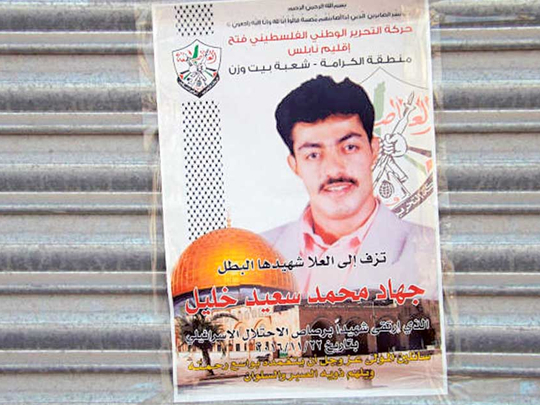
Ramallah: A Palestinian father of three who was murdered last week by Israeli occupation forces had been separated from his family for 12 years, and had been on his way to pray for them.
Jihad Al Qadoumi, 48, from the village of Beit Wazan, west of Nablus in the occupied West Bank was desperately trying to bring his family in Iraq to Palestine, but had been repeatedly blocked by the Israeli regime.
Al Qadoumi was on his way to pray at the Al Aqsa Mosque in occupied Jerusalem to pray to be reunited with his family, when Israeli soldiers shot him dead. They also denied him medical assistance, as they usually do.
They claimed he was attempting to stab an Israeli soldier.
Speaking to Gulf News, Emad Abu Eisa, the head of Beit Wazan’s local council, denied Israel’s claim.
“This is just another extrajudicial killing by the Israeli regime,” he said. “I believe he was just another Israeli target for execution.”
Al Qadoumi was actively involved in the first Palestinian Uprising (the 1987 Intifada), during which he was handed three different prison sentences, including a six-month administrative detention order while he was an undergraduate student at the Birzeit University.
After his release from prison he went to Iraq to continue his studies.
During his stay there, Al Qadoumi established a relationship with the former Iraqi ruler, Saddam Hussain, and his two sons, Uday and Qusay, and was appointed as a member of the board of the Iraqi Olympic Committee.
He also fell in love with an Iraqi woman whom he later married, and they had two sons and a daughter.
In 2004, he returned to his hometown of Beit Wazan, hoping to bring his wife and children to live with him.
He ceased all political activity and dedicated his time and energy in trying to reunite his family.
Al Qadoumi repeatedly applied for Israeli and Jordanian permission to travel to Iraq to see his family, but all his requests were denied.
With his hands tied after being repeatedly blocked, he could only pray for the safety of his family in Iraq where daily bombings and shootings occur.
“He would never jeapordise any chance to bring his family home, so the Israeli claim is highly unlikely. If it is true, they should produce the video footage,” Abu Eisa said.
The crossing is under 24 hour video surveillance.
Dozens of Palestinians have been murdered in cold blood this year. The Palestinian Ministry of Foreign Affairs has called on the US to put pressure on Israel to end its practice of extrajudicial executions.
International legal and human rights organisations have documented Israel’s practice of extrajudicial executions among other crimes contrary to international law.
In March, an Israeli rights group has released a video showing the moment an Israeli soldier appears to shoot dead a wounded Palestinian in Hebron minutes after he had stabbed another soldier.
In the graphic footage, the injured Palestinian, who has already been shot once, was seen still moving. After almost two minutes, an Israeli soldier approached him, aimed his weapon at his head and shot him again.
Later footage shows him lying motionless with blood coming from his head.
Some Palestinians say Israel often plants weapons on Palestinians after they have been killed claiming they had been attacked.












